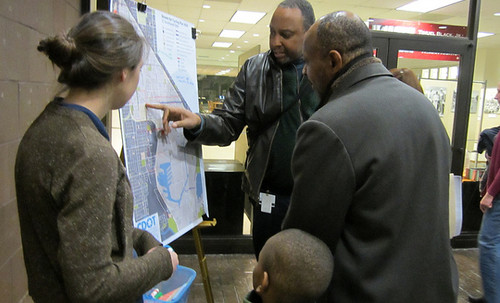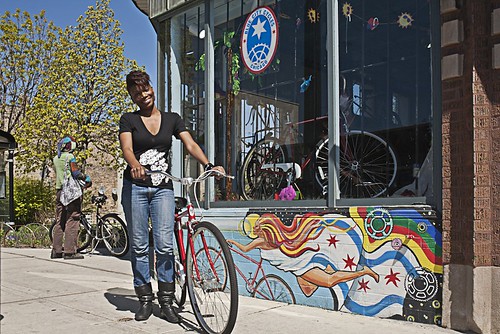A group of African-American bike advocates says they want to do whatever it takes to make sure more black Chicagoans have a chance to enjoy the health, economic, and social benefits of cycling. They've called for the city and state, as well as other advocacy groups, to commit to a more equitable distribution of bike facilities and education to low-income, African-American communities on the South and West Sides.
“In the past, the city’s philosophy has been that the communities that already bike the most deserve the most resources,” said Oboi Reed of Slow Roll Chicago, Red Bike & Green, and Southside Critical Mass. “That just perpetuates a vicious cycle where cycling grows fast in some neighborhood and not others. Biking leads to better physical and mental health, safer streets, more connected communities, and support for local businesses. Black communities are the ones that need those benefits the most.”
As it stands, Chicago has a higher overall density, and better connectivity, of bike lanes downtown and in relatively affluent North Side neighborhoods with higher population density and bike mode share. Their South and West Side counterparts have received more miles of protected bike lanes, due to the fact that wide roads with available right-of-way are more common in these parts of town.
While a number of low-income communities of color, such as Lawndale, Little Village, Pilsen, and Bronzeville, have received Divvy bike-share, a majority of the stations have been installed downtown and on the North Side. The system is slated to expand to more South and West Side neighborhoods next year. The more bikeable areas of the city also have a higher density of parking racks, which residents can request via a Chicago Department of Transportation website.

In an effort to win more bike resources for black communities, Reed has partnered with Peter Taylor, an Active Transportation Alliance board member and president of Friends of the Major Taylor Trail, and Shawn Conley, head of the Major Taylor Cycling Club of Chicago. On November 1, they met in a Woodlawn café to strategize with Eboni Senai Hawkins, founder of RBG Chicago and a member of the League of American Bicyclists’ Equity Advisory Council, Latrice Williams from Bronzeville Bikes, as well as black bike advocates from Minneapolis and Milwaukee.
Out of that meeting came an open letter to the city, state and other advocacy groups, asking for a more fair distribution of bike infrastructure and education, and that more consideration be given to the needs and concerns of black residents when allocating these resources. The letter makes seven specific requests. Among these are that the local governments make a public commitment to prioritize equity, and require contractors who work on transportation projects to do so as well.
The advocates ask the city and state to commit to spending a fair amount of tax dollars on bike resources between 2015 and 2020 in predominantly African-American neighborhoods. The city is also asked to provide an update on the status of recommendations made by community advisory groups for the city’s Streets for Cycling Plan 2020 – Reed and Taylor served as leaders for South Side advisory groups.
The black advocates gave a presentation on their campaign at last week’s Mayor’s Advisory Council meeting. At the assembly, CDOT Commissioner Rebekah Scheinfeld and Active Trans director Ron Burke acknowledged that more effort needs to be made to promote cycling in communities that don’t already have high ridership. Scheinfeld promised that equity would be strongly considered in prioritizing future projects. One of the 2020 Plan’s goals is to ensure that every Chicagoan lives within a half mile of a bikeway.
“CDOT has been focused on building a comprehensive bikeway network throughout Chicago and we are pleased to have advocates like [Reed, Taylor, and Conley] to partner with to help reach those goals,” said CDOT spokesman Pete Scales “We look forward to continuing to work with them to help determine the needs for cycling facilities in every community.”
"The equity statement delivered at MBAC is an outstanding example of the kind of grassroots leadership we need in Chicago,” said Active Trans’ Jim Merrill. He argued that the city is already working hard to equitably distribute new bike infrastructure. “We hope this call for a renewed look at bike equity in Chicago can amplify those efforts, and we look forward to collaborating with advocates throughout the city to build a bike network that serves all Chicagoans equally."
The coalition has made its request for equity loud and clear, but there are different opinions about what’s the fairest way to distribute bike lanes, racks, and Divvy stations. “It would be hypocritical of me to look at what the city has done so far and say there was not a method to the madness,” Conley said. He noted that while his bike club is supposed to host various types of rides, fast road rides predominate because they have the biggest draw. Similarly, he said he understands why CDOT has tended to cater to neighborhoods with large numbers of cyclists who loudly advocate for more infrastructure.
“However, you can’t forget the little guy,” he said. “Equity also means that people in [African-American] neighborhoods have some control over how bike facilities are implemented. I’d like to see more of us invited to the table more often.”
Reed told me he feels bike equity for low-income African-American communities means creating conditions where rates of cycling will begin to approach those of wealthier neighborhoods. “In order to reach parity between Lakeview and Englewood, Englewood needs more investment than Lakeview, not less,” he said.
Reed has recently been attending the “civic tech” incubator Open Gov Hack Night [co-run by Streetsblog's Steven Vance] to enlist help with compiling data to back up the argument that the South and West Sides are underserved for bike facilities. He’s working on creating a graphic that will combine the current bike lanes with maps showing race and income. “But we didn’t want to wait for data to confirm what we already believe, see, hear, and feel, which is that the situation is not equitable."
Hawkins, who help draft the letter, told me she’d like to see the city and Active Trans involve more companies and organizations from black communities in education and encouragement programs. She also said more effort needs to be put into creating culturally relevant bike infrastructure and outreach. For example, Hawkins argued that many African Americans – especially women – are not willing to bike on city streets without physical protection from cars.
Reed acknowledged that there has historically been less support for bike facilities from residents and aldermen on the South and West Sides than from their North Side counterparts. “There’s such a focus on violence reduction and employment that anything that has the perception of taking away resources from that is considered frivolous,” he said. “However, we know the connection between bicycling and more livable, healthy, and economically prosperous communities. We’re prepared to tell that story to community members and elected officials.”
The advocates have already been in talks with CDOT and Active Trans about assisting with outreach efforts in African-American neighborhoods. “We’re asking the city to do more, and they’re asking us to do more,” Reed said. “We want protected bike lanes and Divvy, and they want us to help raise support for these things.”







